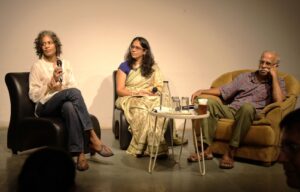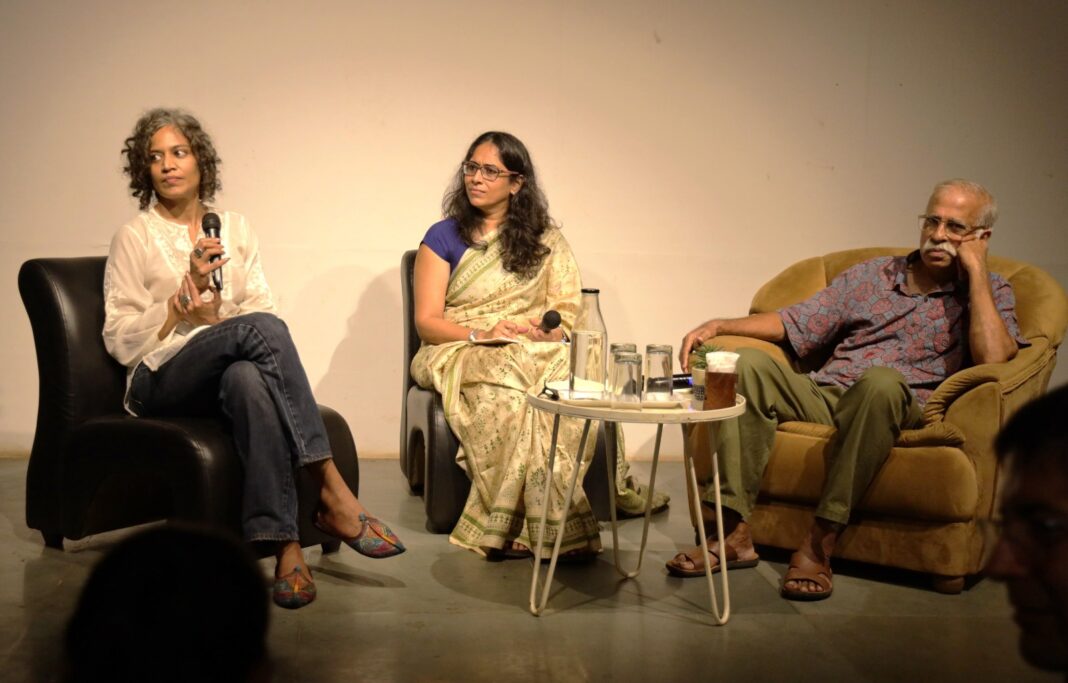Indigenous Agricultural Practices Should be Encouraged to Address Climate Crisis, says Indian journalist, filmmaker Chitrangada Choudhury
~ Award-winning journalist and filmmaker Chitrangada Choudhury’s film ‘Seed Stories’ (2024) highlights Odisha’s Adivasi communities and ecologist Debal Deb’s endeavour to protect over 1000 varieties of heirloom rice.
~ Choudhury screened the film during the recent MOG Sundays talk at the Museum of Goa, followed by a conversation with Goa-based environmentalist Claude Alvares and organic farmer Yogita Mehra.
~ Alvares highlighted the loss of traditional varieties of Goan rice due to commercial agriculture, from over 60 to now only four or five.
~ Mehra proposed growing one’s own food in urban areas to bridge the disconnect between today’s urban generation and nature.
Saligao: Amidst an agrarian crisis of fragile farmer livelihoods and ecological unsustainability, supporting organic indigenous knowledge systems, including around heirloom seeds is the need of the hour, affirmed multimedia journalist and filmmaker Chitrangada Choudhury.
Goa-based Choudhury is an award-winning journalist from Odisha, whose reportage has been honoured with multiple prestigious national and international awards including the Press Council of India’s National Award and the Lorenzo Natali Journalism Prize twice.
Choudhury made the statement at the recent MOG Sundays talk at the Museum of Goa, Pilerne, after the screening of her film, ‘Seed Stories’ (2024), that gives audiences a ‘worm’s eye view’ of indigenous agroforestry practices in the Niyamgiri mountains of Odisha’s Eastern Ghats, a biodiversity hotspot, and the current encroachment of genetically modified cotton monoculture harming the biodiversity-rich landscape and leaving farmers in the lurch in case of crop failure.
“A labour of love since 2019, ‘Seed Stories’ emerged organically on the foundation of my work as a journalist reporting on Adivasi landscapes and people, the environment, and violence in the name of ‘development’. Barefoot ecologist Dr Debal Deb’s conservation farm in Odisha on which he and a three-member team conserve in-situ over 1000 varieties of heirloom rice through knowledge systems possessed by the Adivasi communities, and the coming of chemical-intensivegenetically modified cotton cash crops to this eco-sensitive region form the basis of this documentary film,” stated Choudhury.
Through the film, Choudhury would like audiences to think about what counts as ‘knowledge’ in our society, and what sustainability truly is. She showcases the sophisticated agricultural knowledge that Adivasi farmers have, which elitist systems tend to devalue and condemn as ‘backward’. “We can learn from these communities, and value and support the indigenous communities practicing low-input farming, particularly in these times of climate crisis and unsustainable practices, ,” she said.
Choudhury was in conversation with renowned environmentalist and founder of Goa Foundation Claude Alvares, and organic farmer and founder of Green Essentials Yogita Mehra, who also highlighted the plight of Goa’s rapidly declining traditional rice varieties under similar circumstances.
Claude Alvares stated that before the Green Revolution, there were around 60 varieties of traditional rice in Goa, and today, there are only four or five varieties that are still being grown, albeit with difficulty due to the rapidly changing climate. Alvares also highlighted the disconnect between today’s urban generation and nature, with focus on the food being consumed without knowledge of the ingredients.
“The Adivasi or indigenous people follow agricultural and agro-ecological practices that are millenia-old, producing rice varieties that are full of nutrients and have distinct natural flavours. However, our generations suffer from ‘nature-deficit syndrome’, where we are cut off from the diversity of rice. In Goa, the white rice sold in supermarkets can’t be utilised to make traditional Goan sweets, only the traditional Goan korgut rice and other local varieties suffice,” stated Alvares.
As a solution to bridge this disconnect, Yogita Mehra proposed growing one’s own produce in a kitchen garden in urban spaces, as “nothing connects you more to your food than if you grow it yourself. Watching their parents engage with nature this way, children will also be greatly encouraged to take up the practice. Restaurants in Goa can also aid in this sustainable endeavour by attempting to alter their menus to highlight the local seasonal ingredients”.




